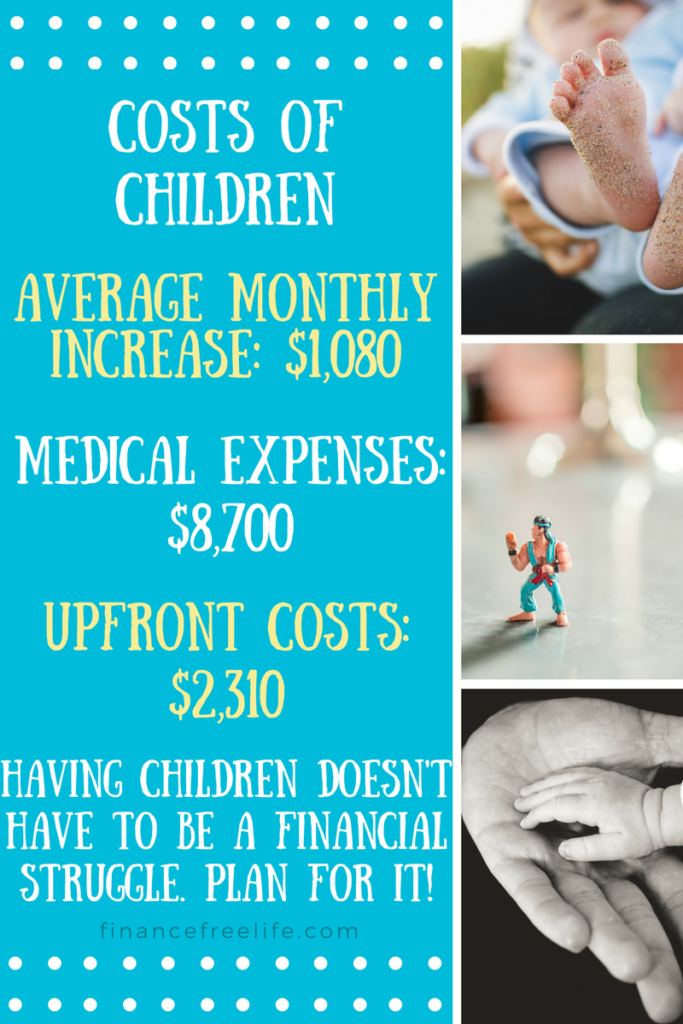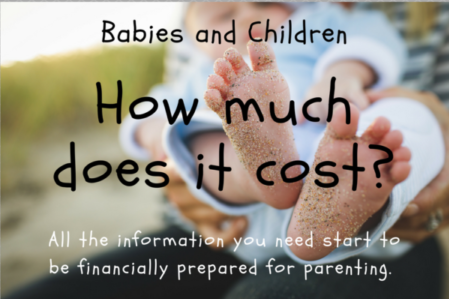The Costs of Children
Car seat: $299
Stroller: $399
Nursery Furniture: $800
Medical Bills: $8,800
Holding your child for the first time: Priceless
While that last statement is true, the costs of having children are significant. Starting a family can happen through a variety of ways – unplanned pregnancies, adoption, in-vitro fertilization, surrogacy, sperm donation, etc. But I would say that on average, most couples do not fully plan financially before having children. Instead, they decide that the time is right, they have a stable income, and they should start a family. Once the child arrives, they manage the finances by going into debt and relying on family and friends to help provide for the child. If they were already in debt, struggling with their finances, this will only worsen the situation.
However, just like any other aspect of your finances, you can prevent a crisis before it starts. How? By fully planning to have a child, including the costs, you can be better prepared – at least on the financial front – to start a family.
According to NBC and BabyCenter, the average cost to raise a child from birth to age 18 – without college tuition – is approximately $235,000. Roughly $13,000 additional per year. That factors in an increase in housing requirements (due to a higher rent or mortgage to live in a larger home accommodating children), as well as daycare expenses. With that in mind, you are looking to spend an additional $13,000 per year to raise a child. Factor that into your monthly budget, you are looking to spend an additional $1,080 per month to raise a child.
$1,080 additional monthly expenses
That is the breakdown of regular, added monthly expenses to have a child. Let’s dive deeper into some of those added costs that aren’t included in that big number.
First, let’s take into consideration the medical expenses to have a child. Prenatal health is the most important thing to consider when you are going through a pregnancy. Buying cute baby clothes, furnishing the nursery, and baby toys may be more enjoyable, but your main financial focus should be on the health of mom an baby. Including prenatal vitamins, nutrition and over-the-counter necessities in addition to medical treatment, you are going to spend an average of $3000 on prenatal care. Add in the costs of delivery, which varies based on the type – average of $2600 for a natural birth, and $4500 for a c-section – as well as post-natal treatment, add in an additional $1200. That’s a total of up to $8,700 just for the pre-baby medical costs. These calculations are made without factoring insurance benefits into the costs. Insurance may cover anywhere between 25% and 90% of the overall costs.
$8,700 medical expenses (without any complications)
Another financial area to consider is any “up-front” costs you may need to invest before the child arrives, like furnishing a bedroom, wardrobe, and potentially moving to a larger space. These are all factors you need to include. Diapers, on average, are going to cost approximately $700 for the first year, plus wipes. Furnishing the nursery, complete with crib, glider chair, changing table, etc… approximately $450-$600. Mobility necessities (stroller, diaper bag, car seat), approximately $650. Clothing costs for the first year average out to approximately $60 per month – to be prepared let’s say a 6 month wardrobe plan – $360.
$2310 upfront expenses

These are some pretty big dollar amounts for a pretty small human. But having a child is not cheap. And unfortunately, most people do not plan for it financially like they should. They think they can simply cut costs, clip coupons, stop eating out, until their money starts to make sense. They don’t realize the costs of having children until they have to, setting them down a lifestyle path of debt and financial struggles. If at all possible, we want to help you avoid that mistake. Just like any other budget choice, make sure you are financially prepared for the cost of expanding your family.

